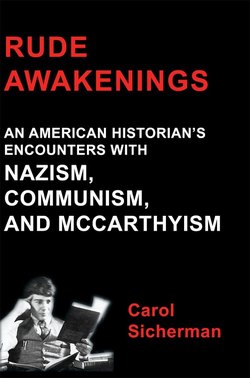Читать книгу Rude Awakenings: An American Historian's Encounter With Nazism, Communism and McCarthyism - Carol Jr. Sicherman - Страница 12
На сайте Литреса книга снята с продажи.
Undergraduate studies
ОглавлениеHarry’s plan to emulate Sinclair Lewis’s bicochemist hero vanished when he earned a C in analytical chemistry. What to do? Before signing up for courses in his sophomore year, he asked his adviser, a physicist, whether a history major would be a good idea. The answer–“Why not?”–sufficed for him to enroll in a course taught by a new instructor, William L. Langer. As a freshman Harry had taken History 1 to fulfill a distribution requirement; he had done “tolerably well” and had been deeply impressed when Langer guest-lectured in the course for two weeks. Regarding American history as too easy because it didn’t require mastery of foreign languages, he decided to concentrate on European history even though he earned a D in second-year German. Despite this unpromising start, by the time he graduated he had arrived at a focus, an intellectual passion, and much better German. He had also forged two professional relationships that were to be important throughout the 1930s. Langer, who was later to supervise his doctoral dissertation, had “ignited” his desire to become a historian. The other relationship, illustrated in Chapter 3, was with Langer’s sabbatical replacement in Harry’s senior year, a visiting professor from Oberlin College named Frederick B. Artz. No doubt he took History 42, Problems in the History of Continental Europe from 1870 to 1914, a graduate course open to senior Honors students, which was normally taught by Langer but that year by Artz. Meanwhile, a term paper on the German Social Democratic Party (SPD), written for the economic historian Edwin F. Gay in his sophomore year, set his scholarly direction for the next decade.45 His 112-page undergraduate thesis on the SPD, presumably supervised by Artz, showed that he was reasonably comfortable reading and translating German; it also demonstrated a lucid, self-conscious, and sometimes witty style that could carry the weight of his characteristic questioning. His topic was suitable for further development because, as he noted in introducing his bibliographical notes, there were “no good histories of the party in any language which cover its development completely in the period 1890-1914.”46 His doctoral dissertation, built on the foundation of his Honors thesis, did not completely fill this gap, for it stopped at 1903, only a brief epilogue extending it to 1914.
